
1. Expressions in English classified under different heads. Pair up with your partner, guess and match the columns. (Use a dictionary.)
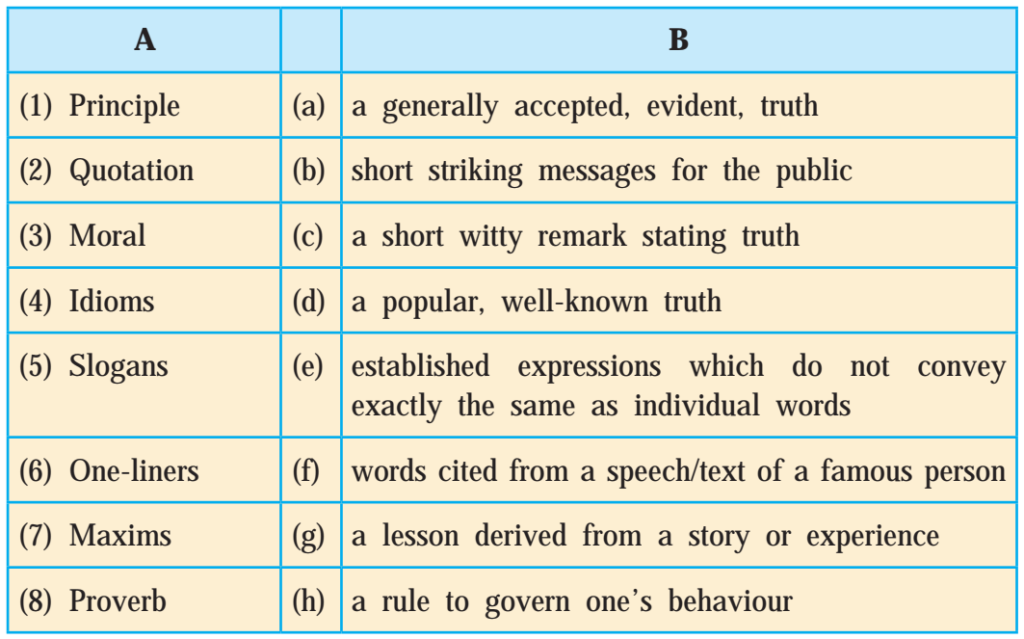
Ans. (1 – h), (2 – f), (3 – g), (4 – e), (5 – b), (6 – c), (7 – a), (8 – d)
2. Read the polite requests/suggestions and complete the gaps in the responses. Make sure they are polite and not repeated.
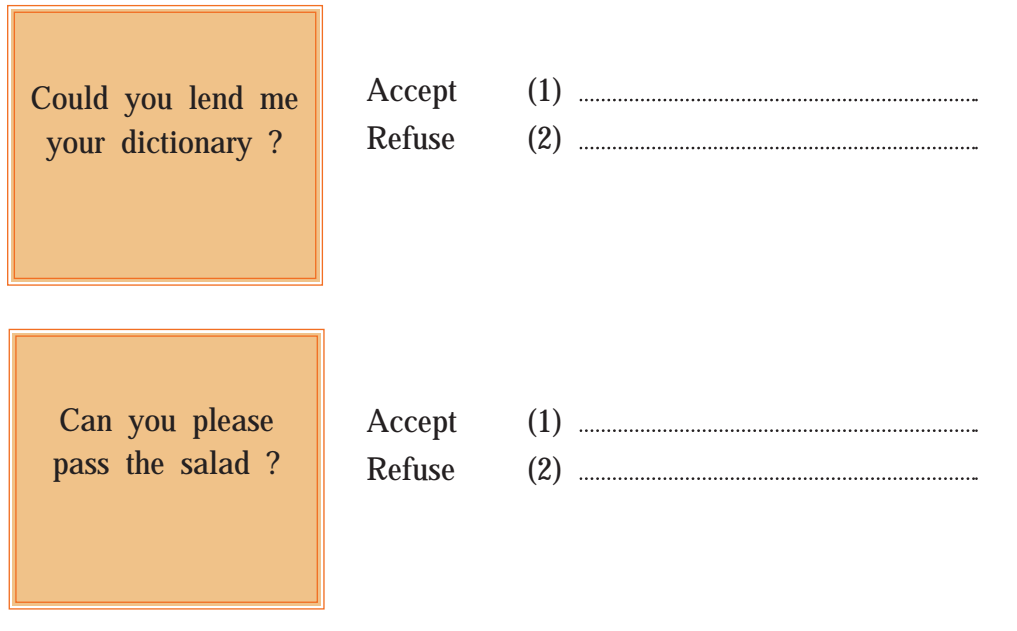
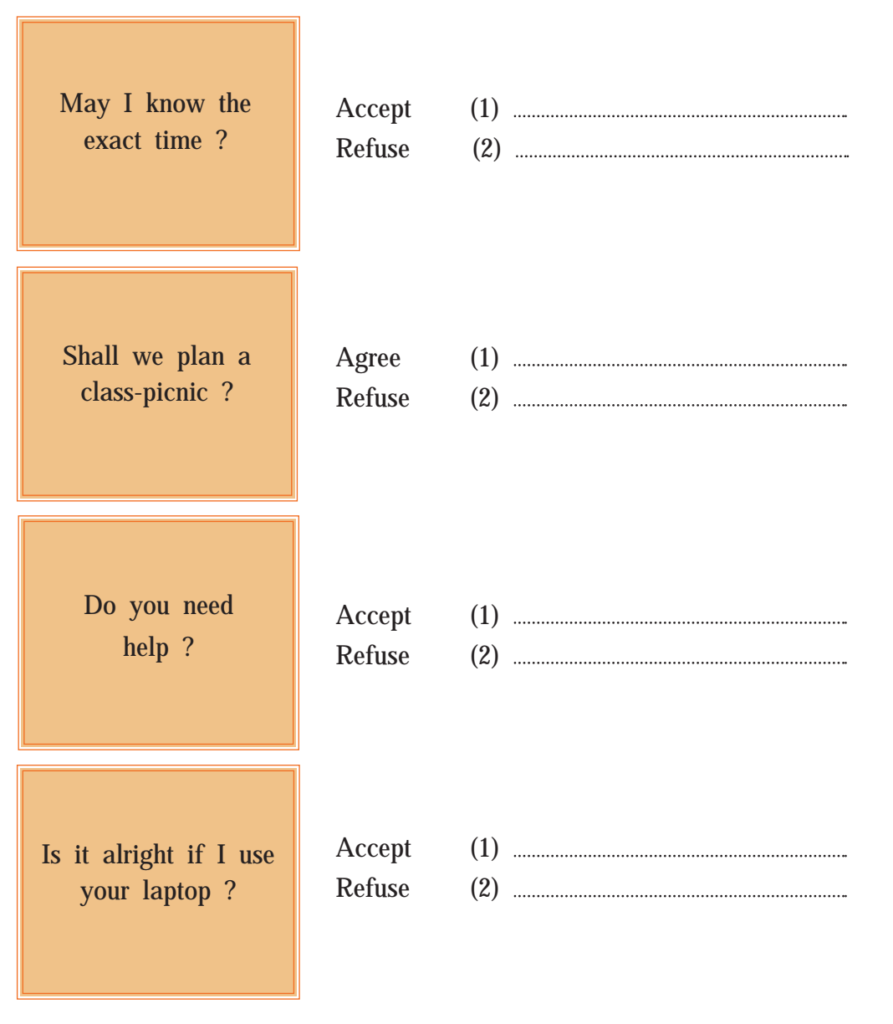
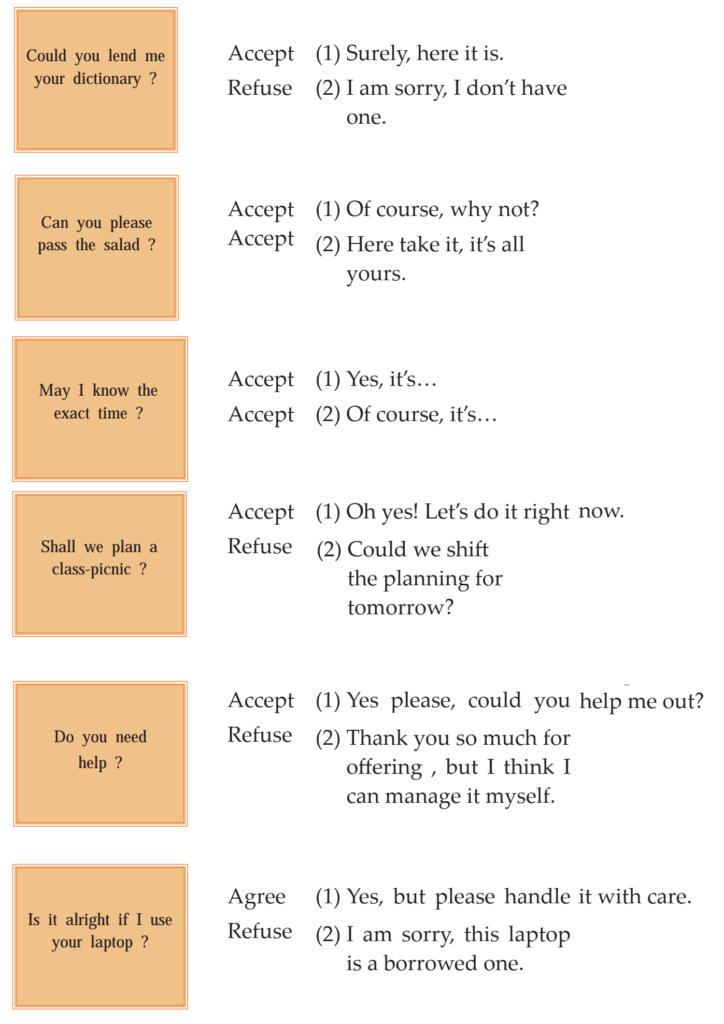
3. Let’s see if you remember a nursery rhyme you must have sung, as a kid :
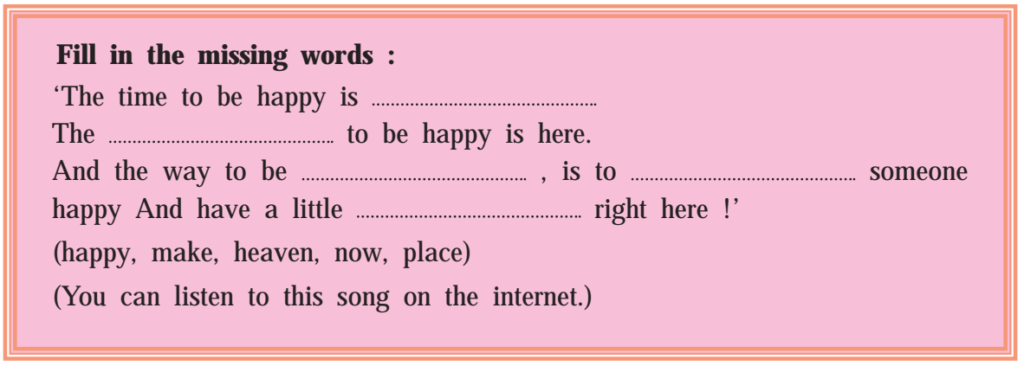
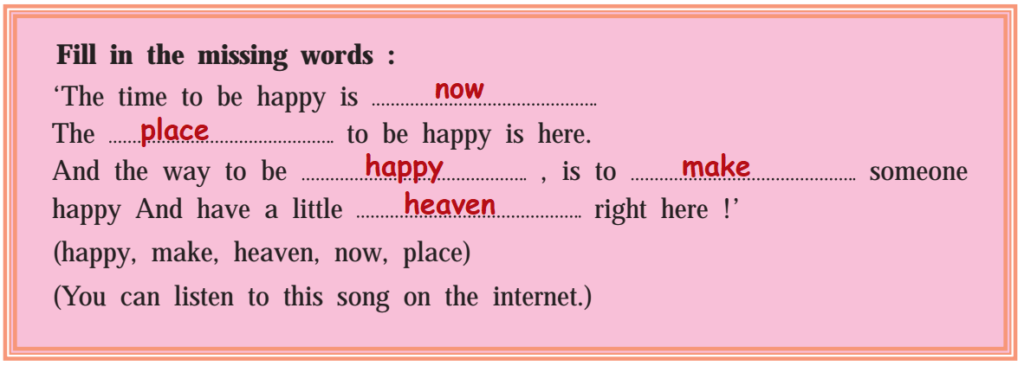
… FACTUAL QUESTIONS …
What is the right time according to you ?
Ans. The right time according to me is ‘now’, i.e. the present moment. It is what we do now that makes or breaks our future. If we use our ‘now’ fruitfully then success will be ours.
What final suggestion did the last group of learned men offer, regarding the best time ?
Ans. The final suggestion given by the last group of learned men was that it was impossible for one man to correctly decide the right time for every action and so the king should appoint a council of wise men to fix the proper time for everything.
Why did the king go to the hermit in disguise?
Ans. The king went in disguise to the hermit because the hermit spoke only to the common people.
How did the hermit respond to the king’s questions?
Ans. The hermit responded to the king by listening to him silently and then continuing with the work that he was doing, without saying anything in response.
In what state was the bearded man, when he arrived ?
Ans. The bearded man came running out of the forest bleeding profusely because of a wound in his stomach. Although he had pressed his hand against the wound, the bleeding continued. As he reached the king, he fainted and fell to the ground, moaning feebly
Why had the wounded man asked for the king’s pardon?
Ans. The wounded man was the brother of the man whom the king had executed and seized his property. He had sworn to take revenge on the king. He was recognized and wounded by the king’s bodyguards from whom he escaped and if it was not for the king he wouldn’t have been alive. This was the reason the wounded man asked for the king’s pardon.
What qualities of the king stand out as he forgave his enemy?
Ans. The king’s caring nature, compassion and a sense of righteousness stood out as he forgave his enemy.
How did the hermit finally point out the answers to the king’s questions?
Ans. The hermit pointed out that the most important time is – now, because it’s the only time when we have any power. The most necessary person is the one with whom you are and the most important thing (occupation) is to do good to the person who is with you.

1. Read the story and answer whether the following statements are true or false.
(a) The people convinced the King to make a proclamation…………………………
(b) The hermit spoke usually to everyone…………………………
(c) The King received all answers from the hermit……………………….
(d) The person the King saved and helped was his enemy………………………….
(e) To do good to people is the purpose of our life………………………
2. Match the titles with the contents of the proper paragraph.
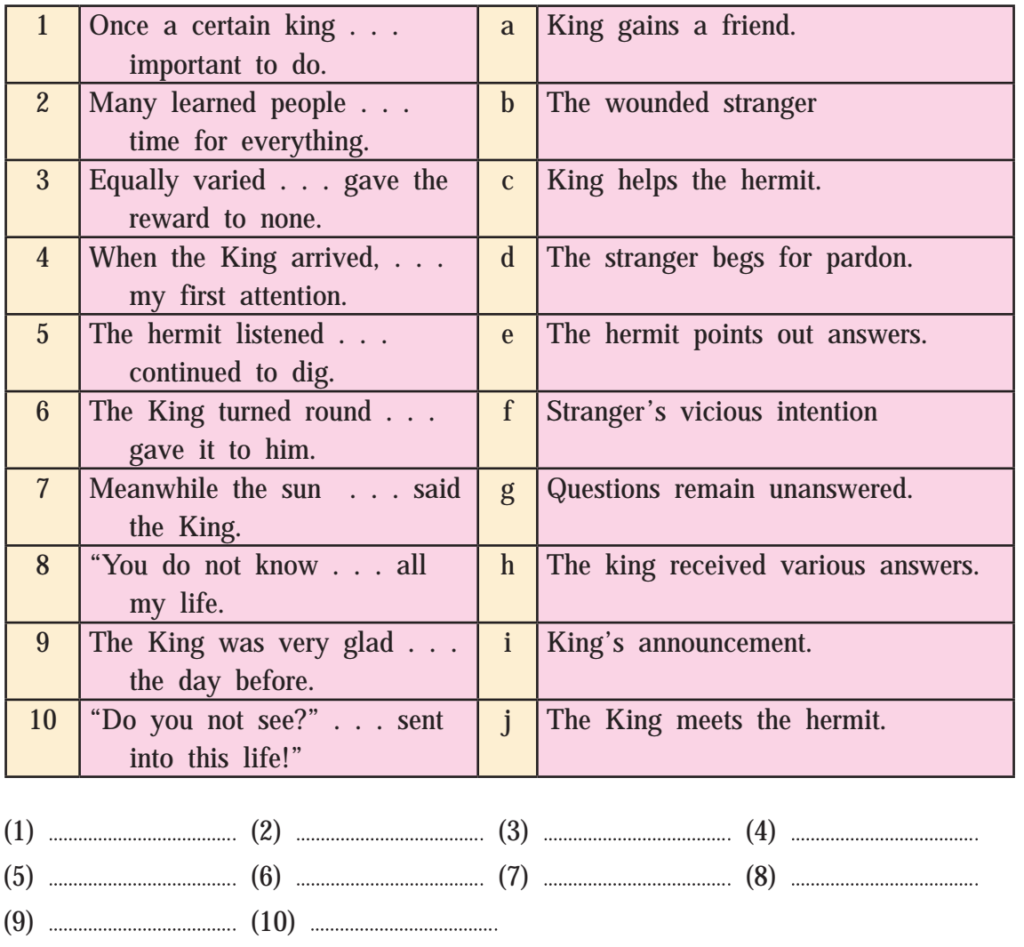
Ans. (1 – i), (2 – h), (3 – g), (4 – j), (5 – c), (6 –b), (7 – d), (8 – f), (9 – a), (10 – e)
3. The character traits of the king and hermit are mixed up. Sort them out in the right box.
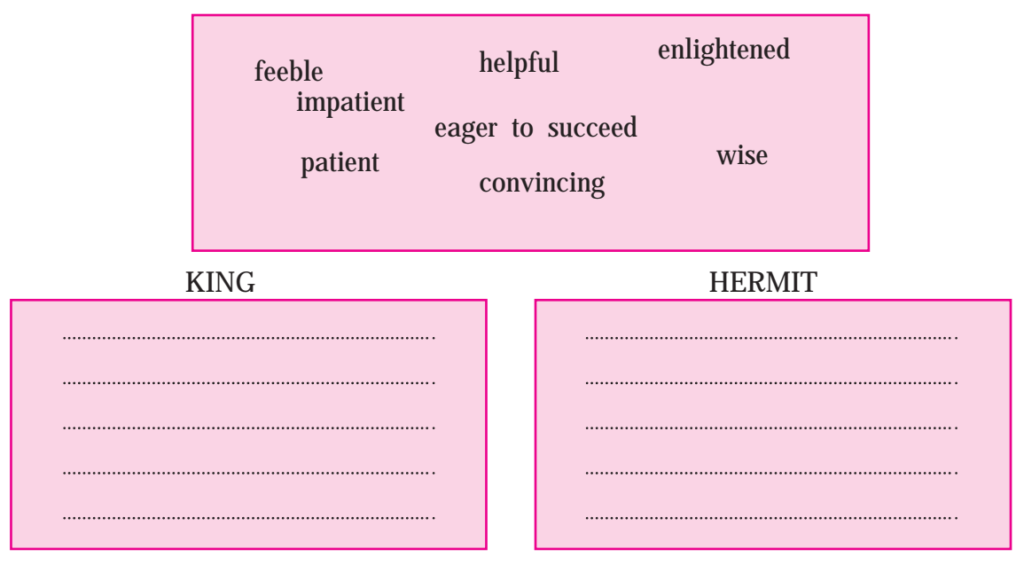
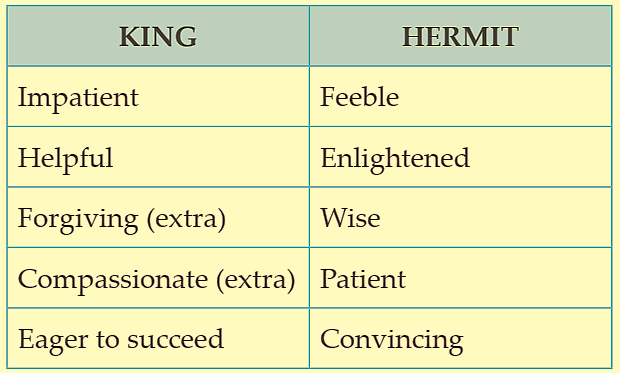
4. Complete the Tree diagrams associated with the happenings in the story.
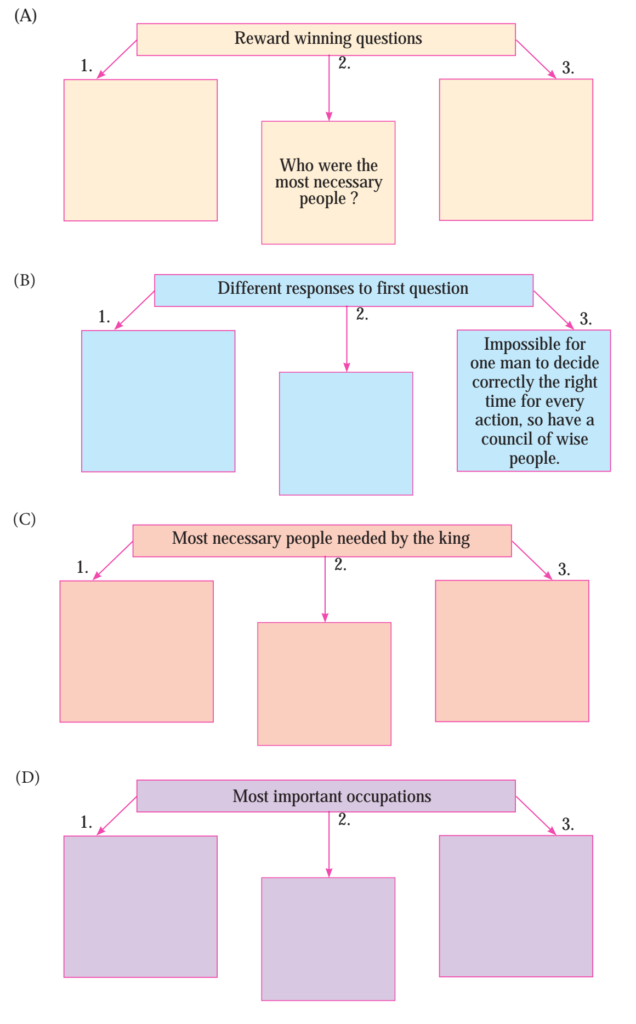
Ans.
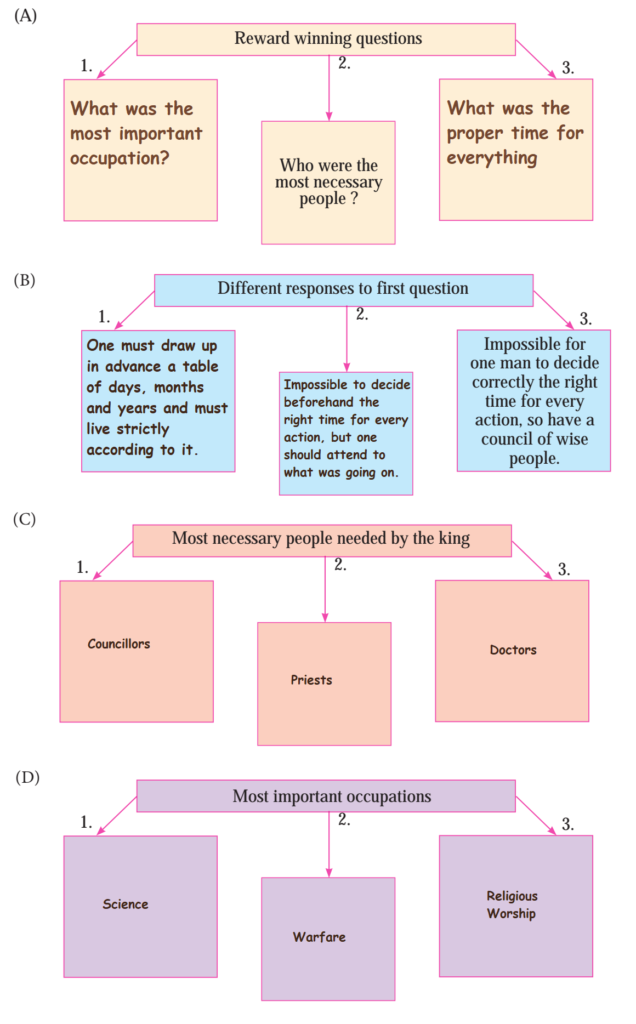
5. Write down in your notebook two points for each of the following. How do you know . . .
(a) the learned advisers who came to the court confused the king.
(b) the king was humble.
(c) the king’s enemy was repentant.
(d) the hermit was truly wise.
(a) the learned advisers who came to the court confused the king.
Ans. None of the learned advisers could give satisfactory answers to the king’s three questions as all of them had conflicting answers as they were not sure.
(b) the king was humble.
Ans. The king dressed as a simple man to meet the hermit. He told his bodyguards not to accompany him. He felt pity for the hermit and took the spade from his hand and started digging the ground. He helped the wounded man without thinking twice.
(c) the king’s enemy was repentant.
Ans. The care and love shown to the wounded man by the king, was the reason he was alive. This brought about a change of heart in the wounded man and he was ready to serve the king all his life.
(d) the hermit was truly wise.
Ans. The hermit’s actions and wisdom gave convincing answers to the king’s three questions. Though there was less talking, the experience which he got when he was with the hermit gave him all his answers.
(a) “Varied” (Paragraph-3) means …………………………
(i) different (ii) unnecessary (iii) unequal (iv) unimportant.
(b) Many learned people came to the court and gave…………………………
(i) The same answers (ii) correct answers (iii) different answers (iv) wrong answers.
(c) The synonym of ‘convinced’ is …………………………
(i) persuaded (ii) happy (iii) unhappy (iv) angry.
(d) The King wanted to know the ………………………… time to begin everything.
(i) right (ii) exact (iii) proper (iv) good.
(e) ‘‘I pray you to answer my question.’’ Here ‘pray’ means ………………………….
(i) plead to God (ii) request (iii) order (iv) suggest.
(f) Choose an adverb that collocates with “breathed ………………………….
(i) hurriedly (ii) heavily (iii) hardly (iv) calmly.
Ans. (a) different (b) different answers (c) satisfied (d) right (e) request (f) heavily
7. Answer the following questions.
(a) The learned people were sometimes divided in their opinions, different persons giving quite different answers; at other times, none of them gave an answer. They all suggested ways to look for an answer. Point out one example of each.
(b) Though the hermit did not say anything to the king for some time, he did not ignore the king or treat him rudely in any way. Do you agree? What evidence of his politeness can you point out ? What shows that he listened and responded to the king’s words?
(c) The hermit ‘spoke only to common people’; so the king ‘put on simple clothes’. Do you think the king hoped to be mistaken for a common man, or was he just showing that he was a humble person? What shows that the hermit knew him to be the king?
(d) Did the king behave as an ordinary person, rather than as a ruler, at the hermit’s hut? What shows it? Did he also act as a good, kind person? When did he do so?
(e) Do you think the hermit knew, beforehand, not only about the king’s arrival but about the ambush by his enemy? Think a little about this and say what you really feel.
(a) The learned people were sometimes divided in their opinions, different persons giving quite different answers; at other times, none of them gave an answer. They all suggested ways to
looking for an answer. Can you point out one example of each?
Ans. Examples of the different opinion and answers given by the people are
(a) “some people said that it was impossible for one man to decide the right time and so a council of wise people should be appointed for the same”
(b) ‘some people said that the warriors were the people most needed by the king.’
(c) ‘Some people said that religious worship was the most important thing to do.’
(b) Though the hermit did not say anything to the king for some time, he did not ignore the king or treat him rudely in any way. Do you agree? What evidence of his politeness can you point out? What shows that he listened and responded to the king’s words?
Ans. Yes, I agree that the hermit did not treat the king rudely or ignore him. The hermit greeted the king though he continued doing his work. This shows the hermit’s politeness. When the king told the hermit that he looked tired and suggested to the hermit that he should take the spade and work a while for the hermit, the hermit silently handed over the spade to the king and sat down on the ground. This incident shows that the hermit listened and responded to the king’s words.
(c) The hermit ‘spoke only to common people’; so the king ‘put on simple clothes’, Do you think the king hoped to be mistaken for a common person, or was he just showing that he was a humble person? What shows that the hermit knew him to be the king?
Ans. I think that the king wanted to show his humility by accepting the fact that the hermit would not speak to anyone except a common man. The king could have demanded an answer from the hermit being the king, but he did not do so. Instead he disguised himself as a common man to keep up to the principles of the hermit. When the king arrived at the hermit’s place, the hermit greeted him but continued to do his work. This shows us that he knew that the person who came to him was ‘the king. He knew that the king did not want anything other than the answers to his questions as he must have heard the proclamation.
(d) Did the king behave as an ordinary person, rather than as a ruler, at the hermit’s hut? What shows it? Did he also act as a good, kind person? When did he do so?
Ans. Yes, the king not only disguised himself as a common man but also behaved like one. He saw that the hermit was tired from digging and took the spade from the hermit and began to dig the ground himself. Yes, the king was a good and kind person because he helped to revive the wounded man. He not only made peace with the wounded man who had come to kill him but also promised to send his own men and physician to attend to him.
(e) Do you think the hermit knew, beforehand, not only about the king’s arrival but about the ambush by his enemy? Think a little about this and say what you really feel.
Ans. I think that the hermit must have known before hand not only about the king’s arrival but also about the ambush. He just acknowledged the king with a greeting and continued doing his work without answering the questions asked by the king which was a little weird. According to me he may have been building time so as to save the king’s life.
8. Consider this list of the different things that happened and rearrange them in the order of time, that is, what happened first, what happened next and so on.
Read the related paragraph again if you are uncertain.
(a) The bearded man resolved to kill the king.
(b) The king went alone to see the hermit.
(c) The king executed the bearded man’s brother.
(d) The king spent the night at the hermit’s hut.
(e) The bearded man laid an ambush to kill the king.
(f) The king’s bodyguards recognised and wounded the bearded man.
(g) The bearded man came out of the ambush.
(i) The king executed the bearded man’s brother.
(ii) The king went alone to see the hermit.
(iii) The bearded man resolved to kill the king.
(iv) The bearded man laid an ambush to kill the king
(v) The bearded man came out of the ambush
(vi) The king’s bodyguards recognised and wounded the bearded man.
(vii) The king spent the night at the hermit’s hut.
9. Read the story in your own language, summarize the following aspects of the story in 4 to 5 lines each in your own language. Write it in your notebook.
(a) King’s problem : …………………………………………..
(b) Attempts made to find a solution :………………………………………
(c) Climax :…………………………………….
(d) Solution :…………………………………….
(e) Message :……………………………………….
(i) King’s problem:
Ans. The king felt that if he knew the right time to begin anything, the right people to listen to or avoid, and the right occupation to take up, he would be able to rule his kingdom well.
(ii) Attempts made to find a solution:
Ans. The king made a proclamation of rewarding handsomely those who could answer his questions. Unsatisfied by the answers he received, he visited a renowned wise hermit convinced he would get his answers from him.
(iii) Climax:
Ans. The king finally goes out to meet the hermit one last time after making peace with his enemy who had come there with the intention of killing him. This is when the hermit speaks to the king and points out that the king already had the answers to his questions. He proceeds to explain what he means thereafter.
(iv) Solution:
Ans. The king got his answers through all that he experienced throughout the day with the hermit. The actions and wisdom of the hermit gave the answers to the king’s questions. The most important time is ‘now’, the most important person is the one you are with at that point of time and doing good for the person who is with you in the most important work, were the answers that he found with the hermit’s help.
(v) Message:
Ans. You have been sent into this world to do good deeds so do all the good you can to everyone around you. Love others as you would expect others to love you because love is the base of human existence. “Do all the good you can, by all the means you can in all the ways you can, in all the places you can, to all the people you can, as long as you can.”
– John Wesley
10. (A) The following compound words from the story are spelt in a jumbled order. Rearrange the letters to make them meaningful.
(1) a r e e t u k d n = ……………………………….
(2) y o n n a e = ……………………………….
(3) s t a p s i e m = ……………………………….
(4) d u b g y r o a d = ……………………………….
(5) f r a w e r a = ……………………………….
(6) h e e d a r f o n b = ……………………………….
(7) h e i l n e w a m = ……………………………….
(8) n e v h i g r e t y = ……………………………….
(1) undertake (2) anyone (3) pastimes (4) bodyguard (5) warfare (6) beforehand (7) meanwhile (8) everything
(B) From the story, find the collocations of the following.
(1) ………………………. important.
(2) ………………………. intently
(3) frail and ……………………….
(4) widely ……………………….
(5) ………………………. time
(6) ………………………. blood
(7) simple ……………………….
(8) ………………………. closed
(9) ………………………. asleep
(10) ………………………. peace
(1) most
(2) gazing
(3) weak
(4) renowned
(5) right
(6) warm
(7) clothes
(8) eyes
(9) fell
(10) made
11. Say whether the Verbs underlined in the sentences are finite (limited by the number or person of the subject) or non-finite (not governed by the subject,
number or person).
(1) He decides to go to a hermit.
(2) I have come to you, wise hermit.
(3) He gave the reward to none.
(4) The hermit was digging the ground.
(5) I pray you to answer my questions.
(6) ‘‘Forgive me.’’
(7) The sun began to sink.
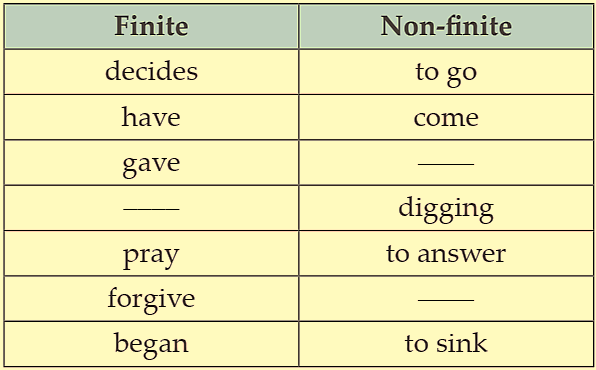
12. Narrate an experience of your own that has helped you to realise that ‘Patience is bitter, but its fruit is sweet.’ Write it in your notebook, in about 20 lines.
I had been helping a dyslexic child to cope up with the English language. I tried all the methods to develop interest in the child for the language. This child would go into his dream world many times. At the beginning, I use to coax him out of his dreams by peeping into his dreams and asking about it. As time passed, I felt I was not making any substantial improvement in the child. The child is very intelligent but has a very short attention span. The year went by and his final exams got over. Although I did my best I was unsure of the result and this pained me a lot. His Mother wanted me to help him the next year also.I was a little dejected because I felt that my hard work was wasted. I told his mother to give me some time to decide. In the meanwhile his results were out and his class teacher praised him for doing exceptionally well in English. When I got to hear about this, I was so elated and then and there I decided to help him till the time he needed me.
13. After reading this story, develop a dialogue with 2 of your classmates about the characters in the story. Besides the tactful introduction to the conversation and write 8 to 10 sets of dialogues.
(The king wants answer to three questions which will help him rule his kingdom better. A proclamation that satisfying answers carried handsome rewards make many wise people
arrive at the palace but none of them are able to give the king convincing answers. He hears about a wise, renowned hermit and decides to go to him in disguise because the hermit entertained only common people. The King reaches the hermit’s hut.)
King: I have come to you learned one to get the answers to three questions which have been bothering me for long.
Hermit: Let me complete what I am doing first.
King: Let me help you while you take some rest.
Hermit: I see someone coming towards us and he looks wounded.
King: Yes, he is badly wounded. Let me see what I can do.
Hermit: You have done a wonderful job. You have not only stopped the bleeding but also revived him.
King: It was my duty to help and that is all I did.
Hermit: Here is where you get all your answers. The right time for anything is ‘now’. The right person to be with is the one who is with you at that moment of time. The right occupation is doing all the good deeds you can for the person who is with you.
King: How wise your words are, learned one, I will always remember them.
Hermit: Go in peace my dear king and rule your kingdom wisely.
The king returns to his kingdom happy and wiser.
14. From the library or Internet, read the story ‘How much land does a man need?’ by Leo Tolstoy and write a review of the same, covering the following points.
⇒ Background of the story
⇒ Characters
⇒ Plot/Theme
⇒ Climax
⇒ Message/Moral
Background of the story: Leo Tolstoy wrote ‘How much land does a man need? “against the backdrop of massive changes in the 19th century in Russia. Until the emancipation of Russian Serfs by Czar Alexander II, the peasants were virtual slaves of landowners and aristocrats, Tolstoy wrote this story after the Serfs had already got their freedom for 25 years. They now had rights and their own land. There was progress among the peasants but Tolstoy was apprehensive whether the peasants’ progress brought changes they would regret. This story brings a harsh warning of unchecked materialism which is clearly established through the fate of Pahom, the protagonist of the story and his sad, untimely death. Characters – Pahom (the protagonist), his wife, his sister-in-law, the Bashkirs and the Devil. Plot/Theme – Pahom, a Russian peasant, overhears his wife and her sister having an argument over whether it is better to live in the country or the city. This lands Pahom to make the dangerous declaration that if he had just enough land, he would not even fear the Devil. The Devil hears this boast and decides to put this to the test and exploits the greed of Pahom. The story relates Pahom’s success in buying land, yet also his dissatisfaction. Climax – Pahom comes to know about the Bashkir region where very fertile land can be purchased very cheaply. The Bashkirs agree to sell him for the 1000 roubles, as much land as he can pace off in a day as long as he returns before the end of the day to the starting point. Pahom walks far, trying to get as much as land as possible, but when he sees more fertile land ahead of him, greed overtakes his senses and he keeps walking further and further away without realizing it would be difficult for him to return to the starting point. In his rush to get back to the starting point which he succeeds in, he collapses and dies. When he dies the Baskhins ask Pahom’s servant to bury him on the same land and he ends up with six feet of land, enough to bury him instead of all the land that he had acquired. Message / Moral – The story tells us about the destructive consequences of human ambition & greed. The message is clear, a warning against biting off more than you can chew. The story shows us how human nature pushes us to want more and more. We are never content, no matter how well off we may be. While trying to improve our standard of living, we put ourselves in danger of ending up with nothing. It gives us the message, how greed and excessive desire for earthly desires can destroy a person.